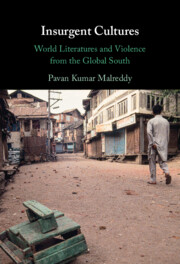Acknowledgments
Some of the material presented in this book has appeared in earlier publications, and I thank the publishers and editors for allowing me to reproduce it here. A section of Chapter 1 appeared as “Militant Metaphors: Rebels, Rogues and Insurgents in Niger Delta’s Conflict Literature,” Postcolonial Text 17, nos. 2–3 (201)2: 1–20. Several passages of Chapter 2 have appeared in “Subalternation: Narrating Burma,” Postcolonial Studies 23, no. 2 (2020): 210–225, and in “Intimate Conflicts: Rebels, Heroes, and Disfigured Terrorists in Burmese Literature,” The Figure of the Terrorist in Literature, Film and Media, ed. Michael C. Frank and Maria Flood (Edinburgh: Edinburgh University Press, 2023), 245–261. Some discussion on the Naxalite novels in Chapter 3 appeared in “Solidarity, Suffering, and ‘Divine Violence’: Fictions of the Naxalite Insurgency,” South-Asian Fiction in English: Contemporary Transformations, ed. Alex Tickell (Basingstoke: Palgrave Macmillan, 2016), 217–234. A few passages of Chapter 4 appeared in (with Ana Sobral) “Violent Worlds: Three Readings from the Global South,” Anglistentag Proceedings (Trier: WVT, 2017), 245–256.
I would like to thank the Open Access Publication Fund, ConTrust Cluster Initiative of Goethe University Frankfurt am Main, and the German Research Foundation (DFG) for their financial support toward the research as well as the open access publication of this book.
This book has benefited immensely from close exchanges with Frank Schulze-Engler, my mentor and collaborator. Editorial assistance from Birte Heidemann, Stephanie Sakson, and Stefanie Kemmerer has been priceless. I am thankful to many friends and colleagues in Germany, India, the United States, the United Kingdom, and Canada who opened their eyes and ears to the material featured in this book: Tom McCarthy, Michael Rothberg, Harshana Rambukwella, Michael C. Frank, Rainer Forst, Lars Eckstein, Florian Stadtler, Johannes Voelz, Alex Tickell, Mihir Sharma, Nahla El-Menshawy, Hanna Pfeifer, Vinzenz Hediger, Maria Belen-Ordonez, Ashok Kumbamu, Janet Wilson, Stephen Morton, Graham Huggan, Mark Stein, Roman Bartosch, Julia Hoydis, Claire Chambers, Niven Kumar, Kathrin Bartha-Mitchell, Russell West-Pavlov, Chantal Zabus, Delphine Munos, Jarula Wegner, Cornelia Argast, Tanaka Chidora, Chijioke Onah, and Geoff Rodoreda.

